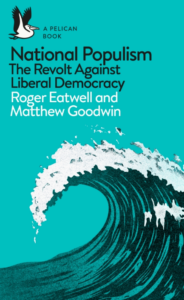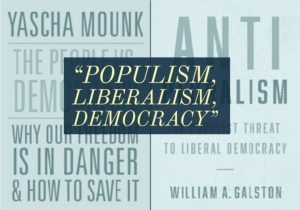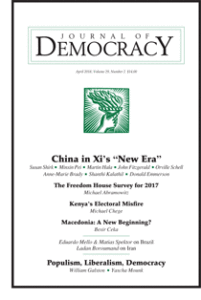 National populists operate within the shell of democratic institutions, and have weakened but not destroyed them, the FT’s John Lloyd writes in a review of Whiteshift: Populism, Immigration and the Future of White Majorities, by Eric Kaufmann, and National Populism: The Revolt Against Liberal Democracy, by Roger Eatwell and Matthew Goodwin. The main arguments of two new books are crucial for our understanding of the times, he states:
National populists operate within the shell of democratic institutions, and have weakened but not destroyed them, the FT’s John Lloyd writes in a review of Whiteshift: Populism, Immigration and the Future of White Majorities, by Eric Kaufmann, and National Populism: The Revolt Against Liberal Democracy, by Roger Eatwell and Matthew Goodwin. The main arguments of two new books are crucial for our understanding of the times, he states:
- First, that populism is here to stay. “The belief that ‘normal business’ will soon resume once economic growth returns and the flow of refugees slows or stops” is comforting but “wrong”, say Eatwell and Goodwin. Kaufmann completes the one-two punch by observing that Britain’s apparent (and unusual, in Europe) return to two-party dominance may merely be an unstable prelude to a populist-right renewal…
- Populism is not, however, fascism. Eatwell and Goodwin use “national populism” as their term of choice, in part to underscore that the leaders and organisations surfing the new trends have not prepared themselves, their parties or their electorates for a movement as serious in its intent as fascism — relying as it does not just on a charismatic leader but on a ruthless party and a mass of people mobilised in their enthusiastic support, willing to be deployed to crush dissent.“Kaufmann counsels leftist liberals to cease seeing electorates who have turned populist — often after years of fidelity to socialist or communist parties — as hopeless racists,” Lloyd adds. “This is Kaufmann’s most striking thesis. With some passion, he concludes that ‘repressing white identity as racist and demonizing the white past adds insult to the injury of this group’s demographic decline. This way lies growing populist discontent or even terrorism’.”
 Every so often, the reader gets a glimpse of the “dark side of national populism”, notes William Davies, the author of Nervous States: How Feeling Took Over the World (Jonathan Cape). But Eatwell and Goodwin treat these aspects as a diversion from the deeper question of what their supporters are seeking, he writes for The Guardian:
Every so often, the reader gets a glimpse of the “dark side of national populism”, notes William Davies, the author of Nervous States: How Feeling Took Over the World (Jonathan Cape). But Eatwell and Goodwin treat these aspects as a diversion from the deeper question of what their supporters are seeking, he writes for The Guardian:
“To reassert cherished and rooted national identities over rootless and diffuse transnational ones; to reassert the importance of stability and conformity over the never-ending and disruptive instability that flows from globalisation and rapid ethnic change; and to reassert the will of the people over those of elitist liberal democrats who appear increasingly detached from the life experiences and outlooks of the average citizen.” It is the pursuit of these goals that characterises the movement or ideology of national populism.
 Advanced democracies enjoy institutional defenses against would-be authoritarian leaders, according to a leading analyst.
Advanced democracies enjoy institutional defenses against would-be authoritarian leaders, according to a leading analyst.
The so-called “deep state” doesn’t exist, but there is “a very deep bureaucracy and it’s hard to move,” argues Eurasia Group analyst Ian Bremmer. Beyond that, the US has also a “polarized and open media” as well as the “rule of law and an independent judiciary” as checks on the president’s power, he said.
“And now you have a divided US government-probably the antithesis of authoritarianism-a government where almost nothing gets done,” Bremmer added.
Four social groups, “classes,” in the European sense, or “tribes,” are re-shaping our political landscapes, argues Thibault Muzergues, IRI’s Resident Program Director, Europe Division, and author of La Quadrature Des Classes (Class Quarters: How New Social Classes are Reshaping our Political Scenes):
- The Urban Creatives, winners of globalization and for whom flexibility and diversity are intrinsic values;
 The Suburban Middle Class, whose social outlook is much more conservative but whose economic views are often compatible in their liberalism with those of the creatives;
The Suburban Middle Class, whose social outlook is much more conservative but whose economic views are often compatible in their liberalism with those of the creatives;- The White Working class, in full rebellion against a system that has left them at the social, political and geographical peripheries and yearn to return to a welfare state that could guarantee their dignity through work; and
- The Millennials, whose rebellion is more collectivist (but not statist), and the result of frustrations accumulated during their early career, when they entered the job market with high hopes from their university years but a career path at least partially blocked due to the 2008 economic crisis.
The political battlefield is no longer in the “political center” of a relatively homogenous middle class whose dominance has defined our political boundaries in the 1980s and 1990s, Muzergues told the Konrad Adenauer Stiftung (the think-tank of Germany’s ruling party CDU) at their yearly International Conference for Political Communication (IKPK) in Berlin. If this middle-class is no longer dominant, but only one of four socio-political groups, can there be a stable democracy? RTWT
When Eatwell and Goodwin engage in social science, rather than market research, the implications are striking, Davies adds:
They identify a nub of the problem as one of major, long-term demographic shifts, in which the population of Africa could be 10 times that of Europe by 2100, with numerous forces driving migration northwards. “The questions that are being asked by national populists about immigration and its associated problems will become even more important,” they assure us. Eatwell and Goodwin like to believe that they and their associates are the only ones facing up to this “uncomfortable” reality, but it is little short of fantasy to claim that, when Salvini demanded a “mass cleansing, street by street, quarter by quarter”, he was just asking a “question”.







